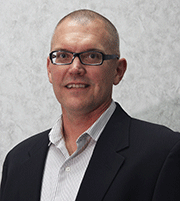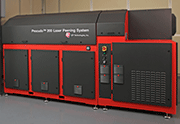E-Archive
Interview
in Vol. 18 - January Issue - Year 2017
Diode-Pumped Laser Peening Equipment Signals Future of Fatigue Enhancement

Eric Collet, Chief Operating Officer at LSP Technologies

Procudo® Laser Peening System
Eric Collet, Chief Operating Officer at LSP Technologies since May 2016, has a degree in Industrial and Systems Engineering and a Master’s in Business Administration.
(?) MFN: Eric, tell us a little about your background and your work at LSP Technologies?
(!) E. C.: I have spent 25 years working in operations, business development, consulting and engineering roles, helping companies in the aerospace and other industries achieve rapid and sustainable growth. I am very excited to join LSPT as COO to spearhead our push toward deeper market saturation of the surface-enhancement industry with laser peening. It is a very exciting time in the business as we rapidly scale up both our laser peening equipment sales and our in-house laser peening production services, largely driven by the new Procudo® Laser Peening System that we have developed.
(?) MFN: Tell us a little about LSP Technologies?
(!) E. C.: LSPT was established in 1995 in Columbus, Ohio, and is the premiere provider of laser peening services and equipment in the United States. Our team has over 250 years of combined laser peening experience, as well as over 50 patents associated with laser peening. We are an AS9100 registered company that performs laser peening production, application development, contract R&D, and peen forming, as well as manufacturing laser peening systems. LSPT is the only laser peening company in the world that is selling, installing, and integrating a fully-licensed, state-of-the-art laser peening system into customer facilities.
(?) MFN: What is laser peening?
(!) E. C.: Laser peening, or laser shock peening (LSP), is a surface enhancement process that imparts superior reliability and performance into metal parts. LSP utilizes a pulsed high-energy laser beam to generate compressive residual stresses within metallic components that increase fatigue life, fatigue strength, and damage tolerance, as well as resistance to corrosion, erosion, and stress corrosion cracking. The compressive residual stresses induced by laser peening can reach as deep as 12 mm depending upon the material and processing conditions.
(?) MFN: What are the material benefits of laser peening?
(!) E. C.: Laser peening is the most effective method to improve fatigue life and fatigue strength of metals. The process strengthens materials at the molecular level, and imparts a stress profile with excellent mechanical and thermal stability. Due to the depth of the compressive stresses imparted by laser peening, the process provides greater resistance to crack initiation and propagation, fretting fatigue, and stress corrosion cracking than any other surface enhancement treatment. Laser peening can even be used to arrest existing cracks that have already become initiated in a material.
(?) MFN: What are the benefits of laser peening to your customers and clients?
(!) E. C.: Laser peening prevents fatigue failures. It is often applied to fatigue-critical areas on mission-critical components, making the process a crucial application for improving safety and reliability. The LSP process is a non-contact treatment which can be performed during component manufacturing, or during maintenance and repair operations to increase the service life of new and fielded parts. Laser peening reduces maintenance and inspection requirements, improves service lifetimes, and enables more efficient designs that reduce weight and improve performance.
The laser peening process is also very precise and customizable. Our modeling enables us to apply precise compressive stress fields tailored for the component geometry, damage mechanism, and operating environment of a specific part. Laser peening is applicable to parts of almost any shape, and quality control is built into the process with real-time process monitoring.
(?) MFN: Can you give us some material examples of applications for laser peening?
(!) E. C.: Laser peening has been applied to a broad range of materials to improve fatigue life, including: high-strength steels, stainless steels, titanium alloys, nickel-based alloys, aluminum alloys, and magnesium alloys.
(?) MFN: Where is laser peening currently being used?
(!) E. C.: The aerospace and power generation turbine engine markets have been the early adopters of laser peening, while additional markets are growing within the automotive and medical manufacturing industries. The LSP technology can readily be applied to fatigue issues in the aerospace, automotive, tool and die, military, medical, power generation, oil and manufacturing industries.
(?) MFN: Shot peening is well-known in the industry and widely used; what are the differences between laser peening and shot peening?
(!) E. C.: The primary advantage of laser peening over shot peening is the greater depth of the compressive stress profile. The residual stresses imparted by laser peening have been shown to provide up to 20x life increases in components that had previously only been shot peened.
Another significant advantage of laser peening is that it imparts a lower percentage of cold work than other surface enhancement processes. This provides both thermal and mechanical stability to the compressive stress field within the part, enabling it to retain its residual strength at higher operating temperatures. Laser peening is also unique from shot peening in that it does not produce environmentally unfriendly waste products.
(?) MFN: What type of laser system do you use for laser peening?
(!) E. C.: We use our own custom-designed-and-built laser peening systems. Our newest system, the Procudo® Laser Peening System, employs a diode-pumped, pulsed YLF laser that produces a flattop spatial profile at a wavelength of 1053 nm. The system operates at selectable repetition rates up to 20 Hz, and emits a continuously-selectable 8-16 ns pulse, with up to 10 Joules of energy per pulse. It is a very versatile machine. The ability to select the laser pulse length and energy allows the user to optimize the laser peening process based on part requirements.
(?) MFN: What makes LSPT’s new laser peening equipment line special?
(!) E. C.: Our Procudo® Laser Peening System is state-of-the-art equipment for increasing fatigue lifetime in metallic components. It is diode-pumped, with fully developed controls and diagnostics specifically designed for laser peening, making it a unique package that is only available from LSPT. Our custom control interface incorporates 20-plus years of experience with laser peening manufacturing requirements. It is easy to program and operate for research use and application development, as well as integrate into full production applications in manufacturing operations. The Procudo® Laser Peening System enables laser peening rates of processing up to 29 inches2 (187 cm2) per minute.
(?) MFN: Where do you see the equipment market growth?
(!) E. C.: We’re currently seeing the biggest growth in the Chinese and European markets, and we expect a larger portion of our future sales to come from those regions. We also see growth within the North American equipment market as more U.S. companies adopt laser peening in response to customer demands for products that can significantly increase fatigue resistance.
This year we are delivering and installing a laser peening system with an integrated laser peening work cell at Guangdong University of Technology, a major materials and engineering research facility in China. We are also partnering with them to introduce and make available production-level capabilities for laser peening within China to Asian manufacturers. We have recently sold a similar laser peening system package to a German research institute which we will deliver near the end of 2017, and we are partnering with this institute to introduce laser peening to a variety of European corporations.
(?) MFN: What prompted the move into the laser peening equipment market?
(!) E. C.: We determined that there was a gap in the equipment supply side of the industry that we could fill due to our unique experience with laser peening technologies. We believe that providing LSP equipment will lead to an increase in the acceptance rate of laser peening by OEMs and Tier 1 suppliers as we continue to provide laser peening services at our Ohio facility.
I’m proud to report we’re succeeding on both fronts now. With the addition of equipment manufacturing and sales, we are seeing increased interest from OEMs in our laser peening services as larger OEMs express interest in acquiring laser peening systems for their own on-site use.
MFN would like to thank Eric Collet for this interview!
For Information:
LSP Technologies, Inc.
6145 Scherers Place
Dublin, Ohio 43016, USA
Tel. +1.614.718-3000
Fax +1.614.718-3007
E-mail: dlahrman@lspt.com
www.lsptechnologies.com


























